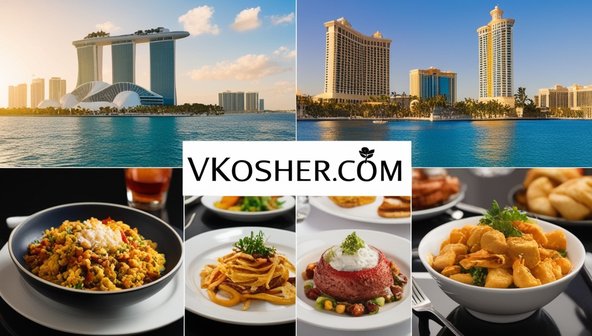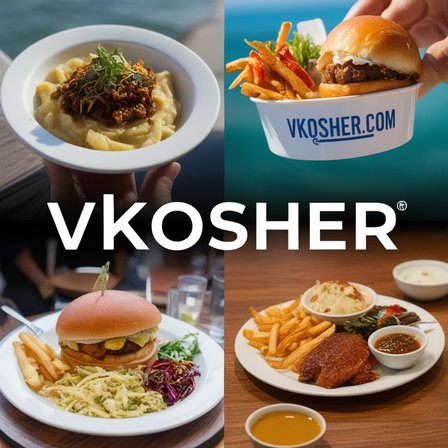Celebrating Hanukkah with Kosher Food: A Guide to Tradition and Cuisine
Hanukkah, the Festival of Lights, is a time of joy, family gatherings, and religious observance for Jewish communities around the world. This eight-day celebration commemorates the rededication of the Second Temple in Jerusalem and the miracle of the oil that lasted for eight days. Central to the celebration of Hanukkah is the observance of kosher dietary laws, which are intrinsic to Jewish identity and culture. The foods prepared and consumed during Hanukkah are not only a reflection of kosher principles but also of the rich historical and cultural traditions associated with this holiday.
The Significance of Kosher Food During Hanukkah
Kosher food is a cornerstone of Jewish life, dictating what can be eaten, how food is prepared, and even how it is consumed. During Hanukkah, these dietary laws take on additional significance as families prepare traditional foods that not only comply with kosher regulations but also symbolize the holiday’s themes of faith, perseverance, and community. The observance of kosher laws during Hanukkah is a way to honor the religious significance of the holiday while connecting with the history and traditions that have been passed down through generations.
Traditional Hanukkah Foods and Their Kosher Preparation
One of the most iconic foods associated with Hanukkah is the latke, a fried potato pancake that symbolizes the miracle of the oil. The process of making latkes involves grating potatoes, mixing them with onions, eggs, and matzo meal, and then frying them in oil. To ensure that latkes are kosher, it is important to use oil that is certified kosher and to follow the separation of dairy and meat, a key aspect of kosher dietary law. Latkes are often served with sour cream or applesauce, and care must be taken to keep these accompaniments kosher as well.
Another beloved Hanukkah food is sufganiyot, or jelly-filled doughnuts, which are also fried in oil to commemorate the miracle. The preparation of sufganiyot requires attention to kosher principles, particularly in the use of kosher-certified ingredients like flour, eggs, and sugar. The jelly filling and any toppings must also be kosher, and if the doughnuts are being prepared in a kosher kitchen, it is essential to avoid cross-contamination with non-kosher foods.
Brisket is another popular dish served during Hanukkah, particularly at festive family meals. This slow-cooked, savory dish is a staple of Jewish cuisine and is prepared in accordance with kosher meat laws. The meat must come from a kosher animal that has been slaughtered and processed according to kosher regulations. Additionally, the brisket is often cooked with vegetables and spices, all of which must be kosher-certified. The separation of meat and dairy extends to the cooking process, ensuring that the brisket is prepared without the use of any dairy products.
The Role of Oil in Hanukkah Foods
Oil plays a central role in Hanukkah foods, symbolizing the miracle of the oil that burned for eight days in the temple's menorah. This theme is reflected in the widespread use of oil in Hanukkah recipes, from frying latkes and sufganiyot to preparing other traditional dishes. The use of oil not only ties the food to the holiday’s religious significance but also enhances the flavor and texture of the dishes.
To maintain the kosher status of these foods, it is crucial to use oil that is certified kosher. Different types of oil, such as olive oil, canola oil, or vegetable oil, can be used depending on the recipe, but each must bear a kosher certification symbol. Additionally, the oil used for frying should be carefully monitored to ensure it remains clean and uncontaminated by non-kosher substances during the cooking process.
Kosher Wines and Beverages for Hanukkah
In addition to food, beverages also play a significant role in Hanukkah celebrations. Wine, in particular, is often served during festive meals and is used in religious rituals. For wine to be considered kosher, it must be produced under strict rabbinical supervision, with every step of the winemaking process adhering to kosher laws. This includes the handling of the grapes, the fermentation process, and the bottling of the wine.
Kosher wine is an essential part of many Jewish holidays, including Hanukkah, and is often paired with traditional dishes. Whether red or white, sweet or dry, kosher wine enhances the meal and adds to the festive atmosphere. Other beverages, such as grape juice, soda, and sparkling water, can also be enjoyed during Hanukkah, provided they are certified kosher.
The Joy of Hanukkah: Family, Food, and Faith
Hanukkah is a time of joy and togetherness, and the foods served during the holiday are a reflection of the warmth and community that define the celebration. Preparing and sharing kosher foods during Hanukkah is a way to connect with Jewish traditions and to honor the religious significance of the holiday. Each dish, whether savory or sweet, fried or baked, carries with it the history and meaning of Hanukkah, making the act of eating not just a physical nourishment but a spiritual one as well.
Family gatherings during Hanukkah are centered around the dining table, where loved ones come together to light the menorah, say prayers, and enjoy a meal. The foods served at these gatherings are often prepared with great care, with recipes passed down from generation to generation. This continuity of tradition is a key aspect of Hanukkah, as each family adds its unique touch to the celebration while adhering to the core principles of kosher cooking.
Modern Takes on Kosher Hanukkah Foods
While traditional foods like latkes and sufganiyot remain central to Hanukkah, many families also embrace modern twists on these classic dishes. Creative chefs and home cooks experiment with different ingredients and techniques while still adhering to kosher laws. For example, sweet potato latkes, gluten-free sufganiyot, and vegan brisket are just a few examples of how Hanukkah foods have evolved to meet contemporary tastes and dietary needs.
These modern adaptations of Hanukkah foods still retain the essence of the holiday, with a focus on the symbolism of oil, the observance of kosher laws, and the joy of sharing a meal with family and friends. The innovation in Hanukkah cooking reflects the adaptability and resilience of Jewish culture, as traditions are honored while also being allowed to grow and change.
Conclusion: The Essence of Kosher Hanukkah Foods
Kosher food is more than just a set of dietary rules; it is a way of life that reflects the values and beliefs of the Jewish people. During Hanukkah, the preparation and consumption of kosher foods take on added significance as they connect families to their faith, history, and community. Whether through the frying of latkes, the baking of sufganiyot, or the slow cooking of brisket, each dish prepared during Hanukkah is a testament to the enduring traditions of the Jewish people.
As families gather to celebrate the Festival of Lights, the kosher foods served at their tables are a reminder of the miracles of the past and the hope for the future. Hanukkah is a time of reflection, joy, and togetherness, and the kosher foods that are central to the celebration are a reflection of these values. By adhering to kosher principles, Jewish families ensure that their Hanukkah celebrations are not only delicious but also deeply meaningful, rooted in the traditions and teachings that have guided them for generations.




